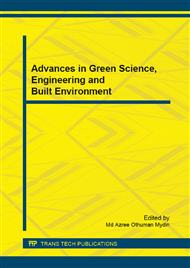p.286
p.290
p.294
p.298
p.302
p.306
p.310
p.313
p.317
Community Participation in Management of Mangrove Villages with Renewable Energy in Teluk Naga District of Tangerang
Abstract:
Mangrove forests have an important role and function in ecological / environmental, social and economic. Currently, mangrove forests have suffered a lot of damage, one of which is in the coastal mangrove ecosystem Tangerang. Tanjung Pasir beach ecosystem condition has suffered damage caused sea water to become cloudy and abrasion occurred in the last three years. To overcome these problems, management through community-based rehabilitation, productive business, the utilization of renewable energy needs to be done. Landscape Development Institute together - with Pertamina has been implementing CSR programs in the area of Tanjung Pasir – Muara and Lemo Teluk Naga.through empowerment, among others, mangrove nurseries, ecotourism development and utilization of renewable energy. The purpose of this paper is to discuss participation in the activities of mangrove villages through renewable energy by using descriptive analysis method. This paper is expected to provide input to coastal development policies
Info:
Periodical:
Pages:
302-305
DOI:
Citation:
Online since:
March 2015
Authors:
Keywords:
Price:
Сopyright:
© 2015 Trans Tech Publications Ltd. All Rights Reserved
Share:
Citation:


